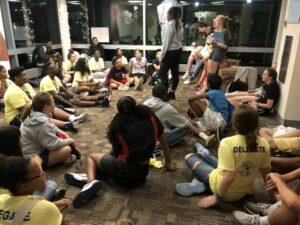
Equipping students with the knowledge to be a good leader—from an understanding of government, politics and global perspective to knowing how to be an engaging public speaker—is important.
But knowledge alone isn’t all they need to become one.
“You don’t suddenly wake up as an adult and have all these skill sets, right?” says Jan Helson, board chair and co-founder of Global Game Changers, a nonprofit organization that supplies resources to educators. “They’re nurtured and are cultivated from very young ages, and all the way from at home.”
One local parent from Clarksville, Shawna Fraizer, sees the exposure to leadership experiences at a young age as a necessity because of the expectations put on children.
Anything that talks about leadership, presentation skills, communication skills, the earlier the better, I think. Our kids have so much expected of them,” Fraizer says.
Fraizer’s son, Zach, 13, participated in a leadership summer camp—one means of giving kids real-life experience in leadership outside of the classroom.
Maryland Leadership Workshops (MLW) is a youth development nonprofit program founded in 1955 by a Baltimore County Public Schools guidance counselor. It provides peer-led training to middle and high school students, serving students all throughout the state.
During the week-long residential program at Washington College in Chestertown, Maryland, campers are given the new title of “delegates.” In their new roles, they take part in sessions including self-awareness and identity, advocacy, motivation and empowerment,
communication skills and group dynamics.
They participate in workshops and projects based on the “best practices [for] youth development and social emotional learning” in educational settings, explains Nick Schmitz, a program leader with MLW.
Learning skills such as these is important not just for kids who want to be in leadership positions.
Though they are skills typically associated with being in charge, Helson says, they help adults and kids every day at work or school, or anywhere else where they’re dealing with
challenging situations.
“It’s so easy to hide behind either a screen or a phone or whatever it happens to be, as opposed to being able to face something face-to-face and also being able to do something in that moment,” she says. “So, the idea that you get kids together and give them the opportunity to interact, to have disagreements, to challenge each other, to beat each other to make cases for their positions, [is] really critical.”
Fourteen-year-old AJ Marshall, from Silver Spring, Maryland, especially appreciated the camp’s focus on teamwork, noting that doing a presentation “taught me how to work as a group—and gave me more practice working as a group,” he says.
Frazier says it was also very important that her son, Zach, saw camp leaders in action and got real-time feedback. “I learned a lot about leadership, and how there can’t only be one leader,” Zach says.
“It was extremely positive for him to get that validation from somebody who is a leader,” his mother adds. “They were working on a project, and they presented it, and then they got a lot of really good validation there.”
MLW is now managed by Leadership Maryland, another nonprofit with the goal of bringing together professionals from both public and private sectors to tackle Maryland’s most pressing issues. A big focus of the organization is emerging leaders.
One big first step in that direction is MLW’s final project. At the end of the week, campers present a group project to the community, including to state senators. More than 15,000 students have graduated from the program to date.
Like all camps, MLW also allows kids to socialize with peers—another skill beneficial in leadership. With all these modern expectations for children, it’s important to expose children to the concepts of leadership and socialization early on, Helson says.
AJ went into the camp not knowing anyone there, according to his mother, Janine Marshall, and he came out of it with a group chat full of people that he went to the program with. She says that he’s excited to go back and learned a lot from the exposure to new situations he experienced at the camp.
“A lot of the delegates find great bonds and friendships with people they otherwise would have never known from a different part of the state [or] from a different kind of situation, [background,] personality. So, we see them come out of their shell in a really impressive manner,” says Schmitz.
For more information on MLW, including 2024 summer dates, visit mlw.org.







